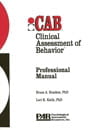
Clinical Assessment of Behaviour cab
For: Provides a cost-effective and time-efficient measure of children's and adolescents' adjustment, psychosocial strengths and weaknesses, and problem behaviours.
Format: Paper-and-Pencil, Software; or Online (PARiConnect)
Length: Approx. 10-15 minutes for the CAB-P or CAB-T Rating Forms; approx. 30 min. for the CAB-PX Form
Scoring: Computer Scored; or Online (via PARiConnect)
Online Forms, Reports, Kits & e-Manuals
All online resources including Forms, Reports, i-Admins, Kits and e-Manuals.
PC Software
Click to browse products
CAB online Score Report (each) min order 5
CAB online i-Admin (each) min order 5
CAB-Parent Extended Form online Score Report (each) min order 5
CAB-Parent Extended Form online i-Admin (each) min order 5
CAB Parent Extended Rating Forms (25)
CAB Parent Rating Forms (25)
CAB Teacher Rating Forms (25)
Sample Reports
![]() Sample CAB PARiConnect Parent Extended Form
Sample CAB PARiConnect Parent Extended Form![]() Download
Download![]() Sample CAB PARiConnect Teacher Report
Sample CAB PARiConnect Teacher Report![]() Download
Download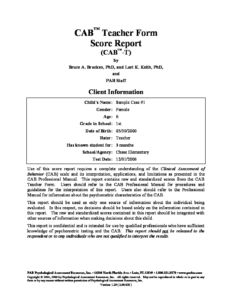 CAB Score Report – Teacher Rating – Sample 1
CAB Score Report – Teacher Rating – Sample 1![]() Download
Download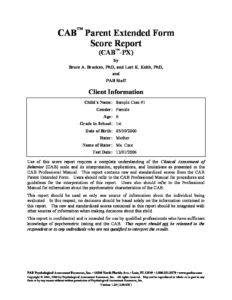 CAB Score Report – Extended – Parent Rating – Sample 1
CAB Score Report – Extended – Parent Rating – Sample 1![]() Download
Download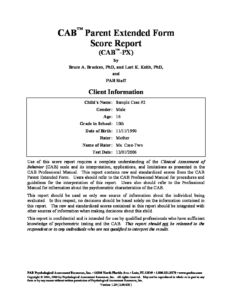 CAB Score Report – Extended – Parent Rating – Sample 2
CAB Score Report – Extended – Parent Rating – Sample 2![]() Download
Download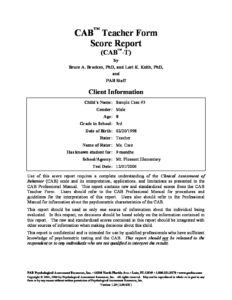 CAB Score Report – Teacher Rating – Sample 3
CAB Score Report – Teacher Rating – Sample 3![]() Download
Download
Contact PAA today to set up your PARiConnect online account to utilise online administration, scoring and reporting.
Authors
Bruce A. Bracken, Ph.D, and Lori K. Keith, Ph.D
Description
The CAB is an objective, comprehensive and highly reliable behaviour rating scale that is closely aligned with current diagnostic criteria found in the DSM-IV-TR™ and IDEA.
Features and Benefits
Assists in the identification of children and adolescents across a wide age range who are in need of behavioural, educational, psychiatric treatment or intervention.
Assesses behaviours that reflect current societal concerns and issues about youth and their behaviour (e.g., bullying, aggression, executive function, gifted and talented).
A balanced theoretical framework of both competence-based qualities and problem-based concerns makes the CAB useful for evaluating adaptive strengths and clinical risks.
IDEA requires that emotional disturbance, an educationally related disorder, be differentiated from social maladjustment; two CAB scales, Emotional Disturbance and Social Maladjustment, may be used to help differentiate these conditions. The Professional Manual addresses these scales with a case example, discussion of interpretation and to further differentiate ED and SM discrepancy score tables for each of the CAB forms.
Test Structure
Three separate rating forms (Parent Extended [CAB-PX], Parent and Teacher) contain corresponding items, allowing parents and teachers to contribute equally to the evaluation of target behaviours.
Requires an 8th-grade reading level for completion.
Included with the introductory kit, the CAB-SP calculates raw scores, T scores, and percentiles for all scales and clusters after hand-entry of item responses. The software generates unlimited complete Score Reports and profiles for all CAB forms.
Technical Information
Normative data include 2,114 parent ratings and 1,689 teacher ratings.
Scale and cluster internal consistency necessary coefficients are .88 and higher across the three CAB forms.
Test-retest reliability coefficients across the three CAB forms ranged from .77 to .95.
Scales and clusters on all CAB forms demonstrate good evidence of validity based on test content; factor analytic studies; convergent and discriminant evidence; and concurrent validity studies across various clinical groups, including conduct/disruptive behavioural disorders, cognitive dysfunction, and ADD/ADHD.
System Requirements
Windows XP, Vista, 7, 8 or 10
Mac users: install Windows in VirtualBox or BootCamp.
Other virtual machine solutions (e.g., Parallels, VMWare) are not supported.
Prerequisites: NTFS file system; Internet connection or telephone for activation; CD-ROM drive for installation.
NB: Prices are in Australian dollars inclusive of GST. NZ customers need to log in to view ex-GST prices.
 NZ
NZ




